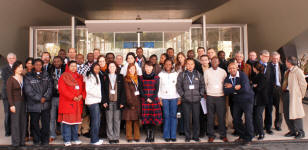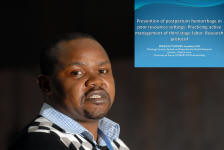GFMER Members - Course participants
Aurelien Pekezou Tchoffo

Dr Aurelien Pekezou Tchoffo
General practitioner, Catholic Medical Heath Centre of Bali Nyonga, Cameroon
Master in Emergency and Essential Care (EEC) at District Hospitals in Developing Countries - University Centre for International Cooperation of the University of Parma
Participant to the Training Course in Sexual and Reproductive Health Research - Geneva 2009
University of Parma/GFMER/WHO scholarship
I’m Medical Doctor, Cameroonian, have been working for 4 years as GP in the Catholic Medical Heath Centre of Bali Nyonga in the North West of Cameroon.
Presently following a Master 2nd level in International Health option “Emergency and Essential Care at the District Hospitals in Developing countries” at the Faculty of Medicine and Surgery at the University of Parma in Italy.
My special interest are Emergency and Essential care , Medical Education and Research.
As GP working in the district level in the low setting environment, emergency and essential surgical care will enable me to overtop the daily emergencies which formally needed reference, to built appropriate training program in the way to empower the other health workers to deal safety and appropriate with emergencies. Other way the collaboration with WHO will help to acquire more emergency equipments and supplies.
This program of Research Methodology achieve the goal to enable the first line health practitioner to have more critical view about his environment in the way to carry out valid studies for the positive changes.
Research to practice
TOPIC: Practice of the active management of third stage labor (AMTSL) among skilled attendant to woman in the North West Cameroon.
“Evidence-base reproductive health care in Cameroon: Population-base study of awareness, use and barriers” a study done in February 2004 by Alan TN TITA and Call, published in the Bulletin of the WHO Vol 83:2005 no 12 Dec 2005 881-968 was estimated ”the awareness and use of evidence-based reproductive health interventions and to describe the barriers associated with the use of evidence-based interventions among health providers in north-west Cameroon”. Among the four vital intervention which were also evaluated they were the active management of placenta delivery with uterotonic. “Only 50/322 (15.5%; 95% confidence interval (CI) = 11.8–20.0) of health workers were aware of all four vital interventions, and only 12/312 (3.8%; 95% CI = 2.0– 6.6) reported using all of them regularly. A deficiency in the education and training of health workers, especially a lack of continuing education, was commonly identified as the most important barrier to their awareness of evidence based practices. A lack of awareness and a lack of supplies and materials were the main barriers to practice”.
Clinical research has showed the efficacy of the active management of the third stage of labor by reducing by 2 the number of the maternal dead in the first hours after delivery . For the achievement of the MDGs by decreasing the 5th goal, WHO in 2006 has strongly recommended the routine management of the 3th stage of labor and the management of complication(uterus atoni and retained placenta) to prevent postpartum blood loss but the prevalence still high especially in developing countries.
Presentations
- Design and construction of a surgery centre in a low resources environment. Concept and project proposal. Aurelien Pekezou Tchoffo - Parma 2009
- Prevention of postpartum hemorrhage in poor resources settings: practicing active management of third stage labor. Research protocol - Aurelien Pekezou Tchoffo - Training Course in Sexual and Reproductive Health Research - Geneva 2009
- Saignement vaginal après l’accouchement ou hémorragie du post partum - Aurelien Pekezou Tchoffo - Stage d’actualisation et d’amélioration des connaissances et des compétences en soins obstétricaux et néonataux d’urgence. Mbrés, République Centrafricaine 2009
Images
Links
- Centro universitario per la cooperazione internazionale - Università degli studi di Parma
- Doctors for Africa - Master in Emergency and Essential Care (EEC) at District Hospitals in Developing Countries - University Centre for International Cooperation of the University of Parma
- Facoltà di Medicina e Chirurgia - Università degli studi di Parma
- Medical schools: Cameroon
- WHO - Emergency and essential surgical care




